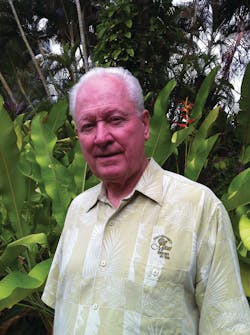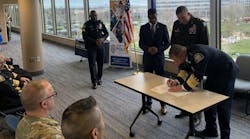“The first time [an officer goes on patrol], that’s very frightening. But he’s been trained to do that. Most undercover training is: ‘Here’s $40. Go into the ’hood and buy some dope.’ That’s it. Now that’s stressful, because I never bought dope as a kid.”
There are a lot of things Charlie Fuller, executive director of the International Association of Undercover Officers (IAUO) wishes he’d known before embarking on his career in plainclothes. Mainly he realized through the years how profoundly undercover work can change you. There are few books written on the subject. Training is scant, too. When an officer goes out into the fray—sans uniform, sans team, and with only one-way communication—it’s easy to feel…not quite like oneself.
Are you a cop? Or are you a duck?
Talk about mind games. As an undercover lying is a prerequisite of the job. When the lies pile up, it can become easy to believe them. It can be even easier to master the art of manipulation. In the thick of his career, Fuller’s “double life” devastated his marriage and had him questioning his own identity.
He argues the most dangerous part of being out of uniform will always be mental. Shootouts happen from time to time in this line of work, but more officers are suspended, fired, jailed or killed because of psychological issues rather than for physical reasons.
“The problem is," says Fuller, "undercover officers have a police subconscious, but that’s not the same as an undercover subconscious.” He explains that most departments don’t adequately transition officers or brace them for this cerebral shift. As an officer, you still have authority. But in a startling way, when the clothes are shucked—the badge and the uniform—so is that authority as seen by everyone with whom you come into contact. It’s kind of like the saying, “the clothes make the man”.
Fuller has what he calls “The Duck Theory”: “They want you to dress like a duck, talk like a duck, act like a duck, deal with ducks…and it’s very easy, if you’re not careful, to become a duck. It’s an erosion of who you really were to begin with. No one really tells [officers] that’s what’s going to happen.”
At the height of his own identity battle—Charlie Fuller, son of an FBI agent and reared in a religious, middle-class environment, was up against the arrogant and dishonest Charlie Dawson. He talks about the trying period in his book “The Art of Undercover: Techniques and Survival.” His first undercover assignment in Polk County, Fla. (for which he volunteered) involved making purchases of illegal weapons as Charles Dawson.
“I distinctly remember asking myself, ‘Charles, are you sure you know what you’re doing?’ I also remember consciously not answering myself because I absolutely did not know what I was doing,” he writes.
He describes his first few assignments as an intensely stressful point in his life when he was ridden with anxiety. “I lived deep undercover in Polk County for four months as Charlie Dawson. I made just about every mistake an undercover agent could possibly make. I trusted a professional informant, lied to my supervisors, compromised my integrity—especially my morality, drank too much, condoned the use of marijuana and broke the law (misdemeanors only). In other words, I lost it! I became the person I was role playing.”
He says the first thing supervisors tell officers going into undercover work is to “quit acting like a cop,” in essence, reinforcing non-police behavior. “But when they come back into the office they say, ‘Quit acting like a duck; you’re a cop, act like one’. Most departments don’t really like their undercover guys,” he says, “because they don’t fit the…mould, and [everyone’s] afraid they’re going to go bad or become a duck. Because when it happens it’s usually pretty dramatic.”
Agency leaders and supervisors need to realize there is a huge difference between regular police work and the undercover realm, and take proper psychological care of their personnel. Fuller describes the uniform as “an electronic field” that keeps the bad stuff out. But when the uniform comes off, there’s no shield other than one’s own values and morals. He adds that “when you realize…hey, I got the skills…I can get a lady to commit a felony, and gladly commit a felony in front of me, that’s pretty powerful.”
On cell phones and screwdrivers
Fuller speaks from his 27-plus years of law enforcement experience with expertise in undercover, electronic surveillance and training; and his time as a Special Agent with the ATF. He believes undercover physical tactics are a significant unrecognized need in law enforcement.
“You have supervisors…test their patrol officer into an undercover unit, and they assume all those fighting tactics they learned at the academy will be what they need over there, and it isn’t at all,” he explains. In fact, the fighting scenario changes in drastic ways when the uniform comes off. One difference is that undercover officers don’t get to start the fight. They also don’t have the luxury of items like a vest, duty belt, (a readily accessible) gun, handcuffs, baton, OC spray, CED, radio, etc.
Undercover trainers stress that officers probably won’t get to their gun in time. So it’s best to find other means of defense. ‘Weapons of opportunity’ might mean a cell phone, or a screwdriver lying on the floor of back seat of a car. Fuller points out that most academies don’t teach students how to fight in a car…however, given the nature of undercover deals and interactions that is precisely where a lot of assaults happen. But it’s not enough to know that a cell phone can be deadly—it should be practiced, too.
“Your brain can’t go where your body hasn’t been,” Fuller says. “And your body has trouble going where your brain hasn’t been. In a violent, physical confrontation, the first place the brain goes is to its training.” Undercovers typically have a body wire, or one-way communication, and gun concealed in a manner where the officer cannot get to it quickly enough. Although they may not have started the fight, these officers need to make sure they finish it. He teaches guys that "in a matter of moments, we‘ve got to hurt [the suspect] so bad that he’s the victim. Now [the suspect] doesn’t have a plan…most agencies don’t recognize the huge physical differences there.”
In a fight there’s no holing off and defending until the rest of the team arrives, they might not show up.
Swapping stories
Many police departments still do not have solid undercover policies in place, and they should. IAUO has a complete, generic undercover policy that agencies might use as a guide when formulating their own. Well-penned policies can help prevent officers going into undercover work from feeling adrift or left to their own devices. Written policy can also help agencies remain aware of necessary training, protocol and procedures to keep officers safe and on-task. Training is out there, too.
Fuller and a range of instructors from across the country share their strategies and tips on how to prepare and handle themselves psychologically, but the classes also teach face-to-face confrontation, what to say when offered drugs, using various fighting techniques, and electronic surveillance tactics. Course leaders strive to keep material current and share what they’ve learned from their own experience.
“That gets me excited…when someone tells me how they dealt with a problem that I’d never heard before,” says Fuller.
“It’s really a personal thing. It’s one-on-one. You can have all the team-planning you want, but when you go there undercover it’s my brain against your brain, that’s it.”



